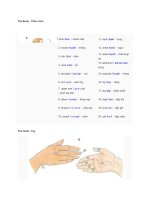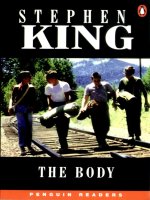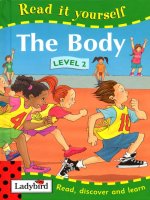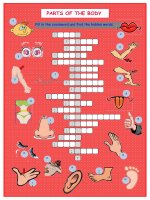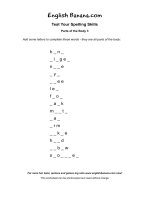The body
Bạn đang xem bản rút gọn của tài liệu. Xem và tải ngay bản đầy đủ của tài liệu tại đây (2.68 MB, 82 trang )
Fall from Innocence:
The Body
STEPHEN KING
Level 5
Retold by Robin Waterfield
Series Editors: Andy Hopkins and Jocelyn Potter
Pearson Education Limited
Edinburgh Gate, Harlow,
Essex CM20 2JE, England
and Associated Companies throughout the world.
ISBN 0 582 41817 8
Fall from Innocence: The Body from DIFFERENT SEASONS by Stephen King
Copyright © Stephen King 1982
Published by arrangement with Viking Penguin, a division of Penguin Books USA, Inc.
This adaptation first published by Penguin Books 1994
Published by Addison Wesley Longman Limited and Penguin Books Ltd. 1998
New edition first published 1999
9 10
Text copyright © Robin Waterfield 1994
Illustrations copyright © Ian Andrew 1994
All rights reserved
The moral right of the adapter and of the illustrator has been asserted
Typeset by RefineCatch Limited, Bungay, Suffolk
Set in 11/14pt Monotype Bembo
Printed in Spain by Mateu Cromo, S.A. Pinto (Madrid)
All rights reserved; no part of this publication may he reproduced, stored
in a retrieval system, or transmitted in any form or by any means,
electronic, mechanical, photocopying, recording or otherwise, without the
prior written permission of the Publishers.
Published by Pearson Education Limited in association with
Penguin Books Ltd., both companies being subsidiaries of Pearson Plc
For a complete list of titles available in the Penguin Readers series please write to your local
Pearson Education office or contact: Penguin Readers Marketing Department,
Pearson Education, Edinburgh Gate, Harlow, Essex, CM20 2JE.
Contents
Introduction
Chapter 1
Chapter 2
Chapter 3
Chapter 4
Chapter 5
Chapter 6
Chapter 7
Chapter 8
Chapter 9
Chapter 10
Chapter 11
Chapter 12
Chapter 13
Chapter 14
Chapter 15
Chapter 16
Chapter 17
Chapter 18
Chapter 19
Chapter 20
Chapter 21
Chapter 22
Chapter 23
Chapter 24
Chapter 25
Chapter 26
Chapter 27
Activities
The Hardest Things to Say
The Tree House Gang
The Forests of Maine
A Jar of Pennies
Making Plans
Brother Denny
The Gun
The Railway
The Dump
Milo and Chopper
Night-Sweats
The Bridge
The Loser's Life
Darkness in the Forest
A Dream of Deep Water
The Deer
Leeches
Short Shadows, Dusty Shoes
A Serious Matter
The Body
Ace Merrill
Hailstones
A Twenty-Year-Old Dream
Love Has Teeth
Empty Kitchen
Some People Drown
Tears for a Friend
page
iv
1
1
5
6
8
9
11
15
17
20
25
28
33
38
40
44
47
50
51
52
58
62
65
67
69
69
72
73
Introduction
'So what's this all about, Vern?' Teddy asked. He and Chris were still
playing cards; I was reaching for a detective magazine.
Vern Tessio said: 'You guys want to go and see a dead body?'
Everybody stopped.
Gordie Lachance and his three friends are always ready for an
adventure. So when a boy dies out in the forest, it's a chance to see
something they have never seen in their lives: a dead body.
But for the four boys, their journey will teach them as much
about life as about death. As they face the dangers on their way, they
begin to learn what it is to grow up — and nothing will ever be the
same for them again.
With the enormous success of books such as The Shining, Salem's
Lot and Misery, Stephen King is one of the world's highest-earning
writers. There are over 150 million copies of his novels in print and
he makes two million dollars a month from his books and the films
made of his books.
He grew up in a poor family in Portland, Maine in the USA, but
he went to university and became a teacher. However, he gave up
teaching and became a full-time writer in 1973 after his first novel,
Carrie.
The Body is different from most of King's work. It is not a horror
story, although there are a few unpleasant moments. It is based
on his own childhood in Maine, and shows a softer side of his'
imagination. It was filmed in 1986 as Stand by Me, with River
Phoenix as Chris Chambers.
You can also read Stephen King's The Breathing Method and
Misery in Penguin Readers.
IV
Chapter 1 The Hardest Things to Say
The most important things are the hardest things to say. They
are the things you get ashamed of, because words make them
smaller. When they were in your head they were limitless; but
when they come out they seem to be no bigger than normal
things. But that's not all. The most important things he too
close to wherever your secret heart is buried; they are clues that
could guide your enemies to a prize they would love to steal. It's
hard and painful for you to talk about these things . . . and then
people just look at you strangely. They haven't understood
what you've said at all, or why you almost cried while you were
saying it.
I was twelve, nearly thirteen, when I first saw a dead person. It
happened in 1960, a long time ago . . . although sometimes it
doesn't seem very long to me. Especially on the nights when I wake
up from dreams in which the hail falls into his open eyes.
Chapter 2 The Tree House Gang
We had a tree house in a big tree which hung over some empty
ground in Castle Rock. It was a kind of club, although it had no
name. There were five or six regulars and some other pussies who
came and went. We'd let them come up when we were playing
cards for money and we needed some fresh blood.
The sides of the tree house were made out of wood, and the roof
was metal we had taken from the dump, looking over our shoulders
all the time because the manager of the dump had a dog which ate
children for breakfast, or so people said. We found a screen door out
there on the same day. It stopped the flies getting in, but it was really
1
rusty. It didn't matter what time of day you looked out through that
screen door: it always looked like sunset.
Besides playing cards, the club was a good place to go and smoke
cigarettes and look at girlie books. We built a secret space under the
floor to hide magazines and cigarette packets when somebody's
father decided to do the Me And My Son Are Best Friends routine
and visit us.
That summer had been the driest and hottest since 1907, the
newspapers said, and on that Friday in September, a few days before
school started again, the grass was dry and brown. Teddy and Chris
and I were up in the club in the morning, complaining about
school being so near and playing cards and telling the same
jokes we'd told each other a hundred times before. Teddy was
laughing his peculiar laugh at the jokes — Eeee-eee-eee, like a finger-
nail scratching on a board. He was strange; we all knew it. Close to
being thirteen like the rest of us, the thick glasses and his deafness
made him seem like an old man sometimes.
In spite of the glasses Teddy couldn't see very well, and he often
misunderstood the things people said to him. His eyesight was just
naturally bad, but there was nothing natural about what had hap-
pened to his ears. Back in those days, when it was the fashion to get
your hair cut really short, Teddy had Castle Rock's first Beatle
haircut — four years before anyone in America had even heard of the
Beatles. He kept his ears covered because they looked like two
lumps of warm wax.
One day when Teddy was eight, his father had got angry with
him for breaking a plate. His mother was out at work. Teddy's dad
took him over to the big oven at the back of the kitchen and pushed
the side of Teddy's head down against one of the burner plates. He
held it down for about ten seconds. Then he pulled Teddy up by
the hair and did the other side. Then he called the hospital and told
them to come and fetch his boy. Then he sat down in front of the
TV with his gun across his knees. When Mrs Burroughs from next
2
The club was a good place to go and smoke cigarettes.
door came to ask if Teddy was OK - she had heard the screaming-
Teddy's dad pointed the gun at her. Mrs Burroughs left the
Duchamp house at roughly the speed of light and called the police.
When the ambulance came for Teddy, his dad explained to the
ambulancemen that although the captain said the area was clear, he
knew there were still German soldiers around. Before long, Teddy's
dad was in Togus, which was a special hospital where they sent
soldiers who were mad from the war. He had been on the beaches
in Normandy and had just got worse and worse ever since. In spite
of what his dad had done to him, Teddy was proud of him and
visited him in Togus every week.
Teddy was the stupidest boy in our gang, I suppose, and he was
crazy. He used to take the craziest chances, like running out in front
of lorries on the road and jumping out of the way at the very last
moment. This made him laugh, but it frightened us because his
eyesight was so bad. You had to be careful what you dared him
because he liked to do anything for a dare.
In the middle of a game of cards we heard someone coming fast
up the ladder which was fixed to the side of the tree. It was Vern
Tessio, one of the other regulars. He was sweating hard.
'Wait till you hear this, guys,' he said.
'Hear what?' I asked.
'I've got to get my breath. I ran all the way from my house.'
'All the way?' Chris asked unbelievingly. 'Man, you're crazy.'
Vern's house was two miles away. 'It's too hot for that.'
'This is worth it,' Vern said. 'You won't believe this.'
'What?'
'Can you all camp out tonight?' Vern was looking at us in
excitement. His eyes were dark and hard in his sweaty face. 'I mean,
if you tell your families we're going to camp in my back field?'
'Yeah, I think so,' Chris said, picking up his cards and looking
at them. 'But my dad's in an awful mood. Drinking . . . you
know.'
4
'You've got to, man,' Vern said. 'Sincerely. You won't believe this.
Can you, Gordie?'
'Probably.'
I usually could do things like that; in fact, I had hardly been at
home all summer. In April my older brother, Dennis, had died in a
Jeep* accident. He had just started training in the army. An army
lorry hit the jeep he was in and he died immediately. He was a few
days short of being twenty. My parents. . .
'So what's this all about, Vern?' Teddy asked. He and Chris were
still playing cards; I was reaching for a detective magazine.
Vern Tessio said: 'You guys want to go and see a dead body?'
Everybody stopped.
Chapter 3 The Forests of Maine
We'd all heard about it on the radio, of course. We had our old
radio on all the time, listening to pop music — Elvis Presley, Roy
Orbison and the rest. When the news came on we usually stopped
listening, but the Ray Brower story was different: he was our
age and from Chamberlain, a town about forty miles away from
Castle Rock.
Three days before Vern burst into the clubhouse, Ray Brower
had gone out with one of his mother's buckets to pick wild fruit.
When night fell and he still hadn't returned, his mother called the
police and the search started. But three days later no one had found
him. We knew, from listening to the story on the radio, that they
were never going to find him alive. Sooner or later they would just
stop searching. They were already sending divers down into the
pools and lakes.
Nothing like that could happen in south-west Maine today.
* Jeep: an army vehicle which is especially good at travelling off the roads.
5
Suburbs have spread over most of the land. The forest is still
there in places, but if you walk steadily in a single direction
you'll find a road sooner or later. But in those days it was
possible to walk into the forest and lose your direction there and
die.
Chapter 4 A Jar of Pennies
Vern Tessio had been under the front of his house digging. Before I
go any further I'd better tell you why he was digging there. And
even before I tell you that, I'd better tell you that Vern and Teddy
were about equal in intelligence - in not having very much intelli-
gence, that is. Vern's brother Billy was even more stupid, as you'll
see.
Four years ago, when he was eight, Vern buried a jar of
pennies under the front of the house, in the dark space he called
his cave. He was playing a game about robbers, and they were
hiding the pennies from the police. He drew a map which
showed where the jar was, put it in his room and forgot about it
for nearly a month. Then, one day when he wanted to go and
see a film and he didn't have enough money, he remembered
about the pennies and went to find the map. But his mother
had tidied his room and taken away the map, along with old
magazines and other rubbish. She had used them to start a fire in
the kitchen the next morning, so Vern's map went up the kitchen
chimney.
Ever since then Vern had looked for the jar of pennies. They
added up to only about three dollars, but as the years passed, and
Vern became more and more desperate about these pennies of his,
the jar held sometimes as much as ten dollars. He never found the
place where he had buried them.
Sometimes we tried to tell him what was obvious to us — that
6
his big brother Billy had known about the jar and had dug it up
himself. But Vern refused to believe this, although he hated Billy.
He also refused to ask Billy about it. Probably he was afraid that
Billy would laugh and say, 'Of course I took them, you stupid pussy,
and there were twenty dollars in the jar and I spent it all.'
Anyway, he was digging there early that Friday morning when
he heard the screen door open and shut above him. He kept very
quiet. He heard Billy's friend Charlie Hogan say, 'Jesus Christ,
Billy, what are we going to do?'
Now, Charlie was one of the hardest guys in town. He was in the
same gang as Ace Merrill and Eyeball Chambers, so he had to be
hard. So as soon as Vern heard him talk like that, he was very
interested. Something big was happening.
'Nothing,' Billy said. 'That's what we're going to do. Nothing.'
'But didn't you see him?' Charlie said. 'It must be that boy in the
news on the radio, the one called Brower or something. Christ,
Billy, the train must have hit him.'
'Yeah, right,' Billy agreed. 'And you puked. It was lucky the girls
didn't see him. They would tell everyone. Do you think they
guessed something was wrong?'
'No,' said Charlie. 'Marie doesn't like to go down that Back
Harlow Road, anyway. She thinks it's frightening out there. But it's
a pity we stole that car, Billy. Now we can't tell the police, because
they would ask us how we got to Harlow district without a car of
our own. And I puked on my new shoes. The guy was just lying
there — did you see him, man?'
They finished their cigarettes and went off to find Ace.
'Are we going to tell Ace, Billy?' Charlie asked as they walked
away.
'Man, we aren't ever going to tell anyone,'' said Billy.
As soon as Vern was sure that they were really gone, he ran all the
way to our tree house with the news.
7
Chapter 5 Making Plans
'You're really lucky,' I said. 'They'd kill you if they knew you had
listened'
Teddy said, 'I know the Back Harlow Road. It ends at the river. I
used to go fishing there.'
'Could he have walked all the way from Chamberlain to
Harlow?' I asked. 'That's twenty or thirty miles.'
'I think so,' Chris said, 'if he was following the railway tracks. It's
easy to walk on them, and he probably thought they would lead
him out of the forest. And then in the dark along comes a train
and. . . bang.'
'Anyway, do you want to go and see. it?' Vern asked. He was so
excited that he could hardly keep still.
'Yes,' said Chris, throwing his cards on to the table. 'And you
know what? I bet we get our pictures in the paper. We'll be
famous.'
'What?' said Vern. Teddy grinned.
'Yeah,' Chris explained. 'We can find the body and report it.'
'I don't know,' said Vern. 'Billy would guess that I heard him
and Charlie talking, and he'll beat me.'
'No, he won't,' I said. 'He won't have to worry any more about
the stolen car and everything.'
'But what about our parents?' Teddy said. 'If we find the body,
they'll know we weren't camping in Vern's back field.'
'We'll just tell them we got bored in the field,' I said, 'and
decided to camp in the forest instead. And then everyone will be
too excited about us finding the body to beat us.'
'OK,' Teddy said. 'Let's all meet here after lunch. What can we
tell them about supper?'
Chris said, 'You and me and Gordie can say we're eating at
Vern's.'
'And I'll tell my mother I'm eating over at Chris's,' Vern said.
8
That would work unless there was some emergency or unless any
of the parents contacted each other. None of us came from rich
families, and neither Vern's nor Chris's house had a telephone. A lot
of people didn't in those days.
My dad had retired from work, Vern's dad worked at a factory in
town. Teddy's mum hired out a room in her house when she could
find someone to take it. Chris's dad was nearly always drunk and
didn't have a job.
Chris didn't talk about his dad much, but we all knew he hated
him like poison. His dad beat him often. Once, the year before,
some milk-money had disappeared from school. Chris was accused
of taking it. He swore he didn't steal it, but because he was one of
those no-good Chambers he wasn't allowed back in school for two
weeks. His father put him in the hospital that time, with a broken
nose and wrist. It's true that he came from a bad family: his eldest
brother Dave was in prison, and Richard (called Eyeball because he
had a bad eye) went round with Ace Merrill and the other local
hard men.
'I think that'll work,' I said. 'What about John and Marty?' John
and Marty DeSpain were two other regular members of our
gang.
'They're still away,' Chris said. 'They won't be back till
Monday.'
We were too excited now to play cards. We all left the clubhouse
and went home to get ready.
Chapter 6 Brother Denny
When I got home, my mum was out. My dad was in the garden,
hopelessly watering the dry plants.
'Hi, Dad,' I said brightly. 'Will it be all right if I camp out in Vern
Tessio's back field tonight with some of the guys?'
9
'What guys?'
'Vern, Teddy Duchamp, Chris.' '
Sometimes he took the opportunity to complain about the
friends I chose, but today he didn't care. 'I suppose it's OK,' he
said.
There was no argument in him that morning; he just looked
sad and tired. He was sixty-three, old enough to be my grandfather.
My mother was fifty-five. When she and Dad got married they
tried to start a family straight away, but with no luck. A few years
later a doctor told them they would never have a baby. But five
years after that, Dennis was born.
The doctor said it was amazing, and that my parents should thank
God and be happy with Denny because he would be the only child.
Seven years later, I was born.
For my parents, one gift from God was enough. I won't
say they were cruel to me or anything like that, but I
certainly came as a surprise, and I guess when you're in your
forties you don't enjoy surprises as much as you used to. They
just acted as if I didn't exist most of the time. I was the invisible
man, like in the book. At the supper table it was 'Denny, how
did you do today at school?' and 'Denny, who are you taking to
the dance?' and 'Denny, we'd better talk man to man about that
car we saw'. If I said, 'Pass the butter,' Dad would say, 'Denny,
are you sure the army is what you want?' If I repeated my
request for the butter, Mum would say, 'Denny, do you want
me to buy you one of those Pendleton shirts tomorrow?' One
night when I was nine, I said, 'Jesus, these potatoes taste like
garbage.' I wanted to see what would happen. And Mum said,
'Denny, Auntie Grace called today and asked about you and
Gordon.'
I didn't hate Denny or think he was the greatest person in the
world either. We rarely did things together. He was seven years
older than me, and lived in a different world. So how could I have
10
strong feelings about him? It was great when he took me to the
park to watch him play ball with his friends, or when he read a
story-book to me, but there weren't many times like that. Most
of the time I was alone. I guess that's why I started reading a lot,
and why I'm a writer now. Like all writers I sometimes try to
put the places and people I knew when I was young into my
stories.
After his death, my parents just went to pieces. Now it was five
months, and I didn't know if they would ever be whole again.
They left Denny's room exactly the same; they didn't touch a
thing. That room frightened me. I expected dead Denny to be
there, waiting for me in the clothes cupboard, with his brains
spilling out of his head from the accident. I imagined his arms
coming up, and him whispering: Why wasn't it you, Gordie? Why
wasn't it you who died?
Chapter 7 The Gun
My room was on the second floor, and it was really hot up
there. I was glad I wasn't sleeping there that night, and the
thought of where we were going made me excited again. I
rolled up two blankets and tied an old belt around them. I
collected all my money, which was less than a dollar. Then I was
ready to go.
I went down the back stairs to avoid meeting my dad. I was
walking up Carbine Street towards the clubhouse when Chris
caught up with me. His eyes were shining.
'Gordie! You want to see something?'
'Sure. What?'
'Come down here first.' He pointed down an alley between two
shops.
'What is it, Chris?'
11
'Come on, I said!'
He ran down the alley and I ran after him. At the bottom, the
smell from the rubbish was terrible. 'Chris, sincerely, I'm going to
puke, I'm -'
But I forgot about the smell when Chris put his hand into his
backpack and pulled out an enormous handgun.
'Do you want to be the Lone Ranger or the Cisco Kid?' Chris
asked with a grin, naming our two favourite TV heroes.
'Jesus, Chris, where did you get that?'
'From my dad's desk.'
'Man, your dad's going to beat you when he finds out.'
Chris's eyes just went on dancing. 'He isn't going to find out. He
and his friends have got enough wine to keep them drunk for a
week. I'll put it back before then.' Chris hated alcohol - he'd already
seen too much of what it can do. He was the only one in our gang
who didn't have a drink when the DeSpain twins brought some
beer they'd stolen from their father.
'Have you got bullets for it?'
'Nine of them — all that was left in the box. He'll think he used
them himself, shooting at bottles when he was drunk.'
'Any in it at the moment?'
'No, of course not. What do you think I am?'
I finally took the gun. I liked the heavy way it sat in my hand. I
could see myself as someone out of an Ed McBain story or a John D.
MacDonald novel. I pointed the gun at a large tin with smelly
rubbish spilling out of it and squeezed.
KA - BLAM!
The gun jumped in my hand. Fire shot from the end. It felt as
if my wrist was broken. My heart was in my mouth. A big hole
appeared in the surface of the tin — it was the work of an evil
magician.
Jesus!' I screamed.
12
I finally took the gun. I liked the heavy way it sat in my hand.
Chris was laughing wildly; I couldn't tell if he was amused or
frightened. 'You did it, you did it! Gordie Lachance is shooting
Castle Rock to pieces. Be careful, everyone! Here comes
Gordie!'
'Shut up! Let's go!' I screamed, and grabbed him by the shirt.
I gave the gun to Chris and he pushed it into his backpack as we
ran up the alley. When we reached Carbine Street we slowed to a
walk, so that no one would notice us if they had heard the noise of
the gun. Chris was still laughing.
'Man, it's a pity you couldn't see your face. Oh, man, that was
really great.'
'You knew there was a bullet in it, didn't you? That was a rotten
trick, Chris, really.'
'I didn't know, Gordie, honestly. I just took it out of my dad's
desk. He always takes the bullets out of it. I suppose he was too
drunk to remember last time.'
Chris looked as innocent as a baby, but when we got to the
clubhouse we found Vern and Teddy waiting, and he started to
laugh again. He told them the whole story, and after everyone had
had a good laugh Teddy asked Chris what he thought they needed a
gun for.
'Nothing, really,' Chris said. 'Except we might see a wild animal.
Besides, it's frightening out in the forest at night.'
Everyone nodded at that. Chris was the strongest and bravest guy
in our gang, and he could say things like that. If Teddy had said it,
we'd all have laughed at him.
'Did you put your tent up in the field?' Teddy asked Vern.
'Yeah, and I put two lamps in it and turned them on, so it'll look as
if we're there after dark.'
'Hey, man, great!' I said, and slapped Vern on the back. For him,
that was real thinking. He grinned.
'So let's go,' Teddy said. 'It's nearly twelve already.'
Chris stood up and we gathered round him.
14
'We'll walk across Beeman's field,' he said, 'and then we'll meet
the railway tracks by the dump and just walk across the bridge into
Harlow.'
'How far is it, do you think?' Teddy asked.
'I don't know,' said Chris. 'Harlow's big. We're going to have
to walk at least twenty miles. Does that sound right to you,
Gordie?'
'Yeah. Maybe more — thirty miles.'
'Even if it's thirty we should be there by tomorrow afternoon, if
no one turns into a pussy,' said Chris.
'No pussies here,' Teddy said straight away.
'Miaoww,' Vern said, and we all laughed.
'Come on, you guys,' Chris said, and picked up his backpack,
blankets and water bottle.
Chapter 8 The Railway
By the time we got across Beeman's field and had reached the
tracks, we had all taken our shirts off and tied them around our
waists. We were sweating like pigs. We climbed the bank up to the
railway, and there we stood and looked down the tracks.
I'll never forget that moment, however old I get. The hands on
my watch stood at twelve o'clock and the sun shone down with
cruel heat. Behind us was Castle Rock, where we had all grown up,
with its houses and its factories sending smoke into the sky and
waste into the river. In front of us were the railway tracks, and the
sun seemed to send us messages off the metal. The Castle River was
to our left, and to our right some empty land, covered in small
bushes.
We stood there for that one midday moment, and then Chris
said, 'Come on, let's go.'
We walked beside the tracks and our feet sent up clouds of black
15
dust at every step. Vern started singing, but soon stopped, which was
better for our ears. Only Teddy and Chris had brought water bottles
and we were all drinking from them a lot.
'We can fill the bottles again at the dump,' I said. 'There's a tap
there with good water, my dad told me.'
'OK,' Chris said. 'That will be a good place to rest, anyway.'
'What about food?' Teddy asked suddenly. 'I bet nobody
remembered to bring something to eat. I know I didn't.'
Chris stopped. 'God! I didn't either. Gordie?'
I shook my head, feeling really stupid.
'Vern?'
'Nothing,' Vern said. 'Sorry.'
'Let's see how much money we've got,' I said. I untied my shirt
and laid it on the ground. We all put our money into it. We had
about two and a half dollars.
'Not bad,' I said. 'There's a shop at the end of that little road that
goes to the dump. One of us can get some hamburger meat and
some Cokes there.'
'Who?' Vern asked.
'We'll, spin coins for it when we get to the dump. Come on.'
I put all the money into my pocket and was just tying my shirt
around my waist again when Chris shouted, 'Train!'
I put my hand on to one of the tracks to feel it, although I could
already hear it. The track was shaking like a living thing. Vern and
Chris jumped down the bank. The train was really loud now.
Instead of jumping, Teddy turned towards the train. The sun flashed
off his thick glasses.
'Come on, Teddy,' I said.
'No, I'm going to wait till it's close and then jump.' He looked at
me in excitement. 'Lorries are nothing, man. This is a train.'
'You're crazy, man. Do you want to get killed?'
'Just like on the beaches at Normandy!' Teddy shouted, and
walked out into the middle of the tracks.
16
For a moment I was too surprised to move, unable to believe
such amazing stupidity. Then I grabbed him, pulled him to the
top of the bank and pushed him over the edge. I jumped after
him and he hit me in the stomach as I landed. I got a knee into
his chest at the same time and he fell down. Then we were
locked together, rolling over and over, hitting and scratching each
other.
'You little worm!' Teddy was screaming. 'Don't you act big with
me! I'll kill you!'
'Teddy!' I shouted back. 'No one must know we're here. Don't
you understand, you stupid pussy?'
Eventually Chris and Vern separated us. Chris held Teddy until
he became calm and just stood there, his glasses bent and hanging
off one ear.
'You're a pussy, Lachance,' Teddy said.
'He was just trying to do the right thing, man,' Chris said
'Come on, you guys,' Vern said. 'Let's go.'
Chapter 9 The Dump
We reached the dump around half past one and slid down the
bank. The dump was surrounded by a high wire fence, and there
were signs saying that the dump was open between four and eight
in the afternoon — no entry at any other time under any circum-
stances. We climbed over the fence and jumped down to the
ground.
We went straight to the tap. While Vern and Teddy argued
about who would go next, I looked round. There was always so
much stuff in the dump that my eyes hurt just looking at it. All of
America was there — all the stuff for which America had no further
use. There were plenty of wild animals too, but not the kinds you
see in Disney films or in children's zoos where they let you stroke
17
the animals. The town dogs came here too. They used to attack
each other over a piece of rotten meat, but they never attacked Milo
Pressman, the manager of the dump, because Milo always had
Chopper with him.
Chopper was the most feared and the least seen dog in Castle
Rock. Rumours and stories had made him enormous, cruel and
ugly. It was said that Milo had trained him to go for particular parts
of the body. He could take an ear, an eye, a foot, a leg or. . . any part
of the body. Even Teddy was afraid of Chopper.
There was no sign of Milo or Chopper today.
Chris and I watched Vern and Teddy at the tap. 'Teddy's crazy,' I
said softly.
'I know it,' Chris said. 'He won't live to be twice the age he is
now.'
'You remember that time in the tree?'
'Of course.'
The year before, Teddy and Chris had climbed a tall tree
behind my house. Chris had stopped near the top because the
rest of the branches looked dry and rotten. Teddy wanted to go
on, and nothing Chris said made any difference. Teddy did it,
though - he reached the top. But then the branch he was on
broke and Teddy fell. Chris just managed to grab hold of
Teddy's hair as he went past. Although his wrist hurt for a
week afterwards, he held him until his feet found a branch to stand
on. When they got down Chris was grey-faced and almost
puking from fear. And Teddy was angry with him for pulling
his hair!
'I dream about it sometimes,' Chris said. 'Except in the dream
I miss him. I just grab a couple of hairs and Teddy goes screaming
down through the branches to the ground. Strange, eh?'
'Right,' I said, and for a moment we looked in each other's eyes
and saw some of the true things that made us friends.
After we had all had enough to drink and had thrown water at
18
one another for a while, we sat in the shadow of the dump's only-
tree.
'This is really a good time,' Vern said simply. He didn't mean just
being here in the dump or going for a walk up the tracks. All that
was only part of it. Everything was there and around us. We knew
exactly who we were and exactly where we were going in life. It
was great.
We sat under the tree until the shadows grew longer, and then we
realized someone had to go and get some food.
'The dump opens at four,' Vern said. 'I don't want to be here
when Milo and Chopper arrive.'
'OK,' I said. 'Odd man goes?'
'That's you, Gordie,' Chris said. 'You're odd all right.'
I grinned and gave them each a coin. 'Spin,' I said.
Four coins shone brightly as they turned in the sun. Four hands
grabbed them from the air. Four flat slaps on four dirty wrists. We
uncovered. Two heads and two tails. We spun again and this time all
four of us had tails.
'Oh, Jesus, that's bad luck,' Vern said, not telling us anything we
didn't know. Four heads meant really good luck, four tails the
opposite.
'Nobody believes that garbage,' Teddy said. 'It's baby stuff. Come
on, spin.'
This time the other three all had tails and I had heads. And I was
suddenly frightened. They still had the bad luck. Then Teddy was
laughing his crazy laugh and pointing at me, and the feeling
disappeared.
'Go and get the food,' Teddy cried.
'Go on, Gordie,' said Chris. 'We'll wait by the tracks.'
'You guys had better not go on without me,' I said. And away I
went.
I never had any friends later like the ones I had when I was
twelve. Did you?
19
Chapter 10 Milo and Chopper
Words mean different things to different people. To me summer
is always going to mean running down the road to the Florida
Market with coins jumping in my pocket and the sun flying my
brains. The word brings a picture to my mind of railway tracks
running off into the distance. There were also favourite songs
and films, games to play, grass to cut, sports to play and teams to
support.
And now I sit here trying to look through an IBM screen and
see that time, and I can almost feel the thin, brown boy buried in
this 34-year-old body, and I can almost hear the sounds I heard
then. But all of that summer is contained in the picture of
Gordon Lachance running down the road to the Florida Market
with the coins in his pocket and the sweat running down his
back.
After I had bought the food I walked fast back to the dump. I put
the bag of food inside my shirt and climbed over the gate. I was
halfway through the dump, towards the back where I had left the
others, when I saw something I didn't like: Milo Pressman's car was
parked beside his office building. If Milo saw me, I was going to be
in a world of pain. Suddenly the other side of the dump seemed
very far away. Why hadn't I gone round the outside of the fence?
But I was too far into the dump now to want to turn round and go
back.
I kept putting one foot in front of the other, trying to look calm,
trying to look as if I belonged here, with a paper bag down the front
of my shirt, walking towards the fence between the dump and the
railway tracks.
I was about fifty feet from the fence and just beginning to
think that everything was going to be all right when I heard
Milo shout, 'Hey, you! Get away from that fence! Get out of
here!'
20

